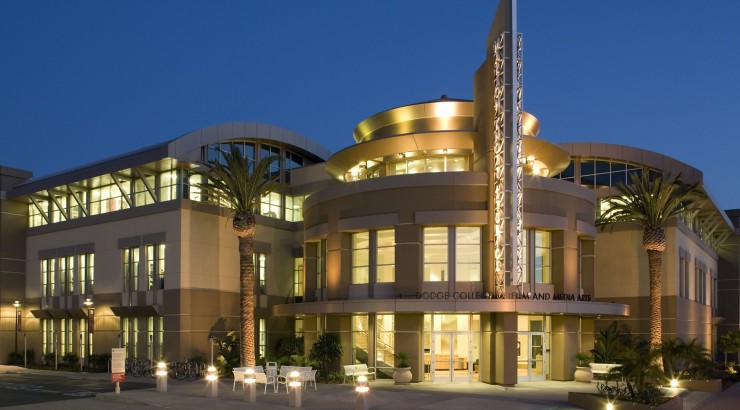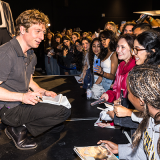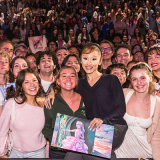2014 Interterm Film Division Courses
November 8, 2013
Interested in taking a class during Interterm? Take a look at some of the exciting courses our film division is planning to offer this coming semester. Registration begins Sunday, November 10.
Location Filmmaking: FTV-271-04/ FTV-371-04/ FTV-571-04
Instructor: Roy Finch
Course Meets: Monday through Friday 10:00 a.m. to 2:00 p.m.
We are happy to announce the 2014 Interterm Location Film Production. As part of an ongoing effort to introduce our students to new and innovative film technologies and the particular aesthetics and practices these have spawned, we have designed the 2014 Location Film class to focus on the creative use of the Xsens Motion Capture technology or Green Screen technology. The objective of the course will therefore be to produce two or more short movies that effectively use these technologies to tell compelling and original stories.
The Motion Capture film(s) will include a character that has been digitally generated using the Inertial Motion Capture technology by Xsens. This motion capture technology is a flexible system that is fully portable and can be used at both indoor as well as outdoors locations.
The course and accompanying productions will be team taught and supervised by Roy Finch.
The class will consist of a combination of lectures, demonstrations, and supervised productions.
The class will begin on Thursday January 6 and end on or about February 1, 2014. Enrollment in the class will be open to students of all disciplines.
The DI Process from Start to Finish using DaVinci Resolve: FTV-329-04/ FTV-529-04
Instructor: Regan Copeland
Course Meets: Saturday 9:00 a.m. to 5:00 p.m.
Offered on consecutive Saturdays during the Interterm session, this course covers all aspects of the Digital Intermediate process including color science, LUTs, digital color spaces, on-set data wrangling, file transcoding, EDL preparation, conforming, professional color-grading techniques, and practical training on the industry standard in color-correction, Blackmagic Design’s DaVinci Resolve. Instructional materials and exercises will follow common DI practices, final editorial procedures and online finishing post-production workflows.
The class will be taught by Regan Copeland, a professional colorist and DI editor working on Hollywood features at Fotokem. In-class lectures will be supplemented with hands-on exercises utilizing the latest color-correction software augmented with class speakers.
Writing the Comedic Film: FTV-329-06/ FTV-529-06
Instructor: Anne Beatts
Course Meets: Tuesday, Wednesday, Thursday 10:00 a.m. to 1:45 p.m.
This course is designed to teach the professional and creative requirements involved in writing film comedy. Students will study film comedy from its early beginnings through the present day and learn to apply comedic principles to their own work. Students will view and dissect four complete filmed comedies as well as studying clips representative of different periods, from the early silent films through current releases. They will examine different genres such as screwball comedy, buddy comedy, ensemble comedy, romantic comedy, teen comedy, action comedy, gross-out comedy, slapstick, mock-documentary, and social satire. By the end of the course period each student will have completed at least ten pages of a comedic feature-length screenplay.
Activist Viral Video: FTV-329-09/ FTV-529-09
Instructor: Jeff Stanzler
Course Meets: Tuesday, Wednesday, Thursday 2:00 p.m. to 6:00 p.m.
Activist Viral Videos will be a way for students to not only get involved and help promote public issues that are important to them through making use of their cinematic skills, but it also will serve as a practical introduction to an important and quickly emerging media art form/career path.
Producer/Screenwriter Workshop: FTV-329-10/ FTV-529-10 & FTV-329-11/ FTV-529-11
Instructors: Madeline Warren & Julie Kirkham
Course Meets: Monday, Tuesday, Thursday 1:00 p.m. to 5:00 p.m.
Screenwriting Students enroll in section: FTV-329-10/ FTV-529-10
Producing Students enroll in section: FTV-329-11/ FTV-529-11
How do writers and producers work together? The writer-producer relationship is one of the most critical components of film making. This course is a workshop for screenwriters and producers to network with one another, and to develop scripts in a collaborative setting based on industry practices. Faculty with experience in studio and independent film development will guide writers and producers in becoming effective collaborators. We will read and discuss each screenwriter’s work, develop constructive notes, and work on revisions in producer-writer teams. Writers will learn how to use notes to stimulate their creative process. Producers will learn how to protect the writer’s concept while facing production realities.
The course will culminate in table readings of writers’ revised scripts, organized by the producers. Screenwriters need a script of 30-to-120 pages to enroll in the course.
**Open to: BFA and MFA Screenwriting students, BFA Creative Producing Students, and MFA Producing Students. Students will receive upper division elective credit.
Directing Actors for Film Intensive
Instructor: Martha Coolidge
Course Meets: Mondays 4:00pm-8:00pm and Thursdays 1:00 p.m.-5:00 p.m. (Instructor Signature Required)
This is an intensive class on directors’ work with actors. It will cover pre-production – including casting and rehearsals, shaping a character, and production set work as well as editing and looping. The class is primarily for directors and actors, but would also benefit interested writers, editors and cinematographers. It will cover various acting techniques, and working with children and non-actors. Special guests will come and speak in class.
The Essentials of Stunts and Special Effects
Instructor: Andy Lane
Course Meets: Tuesdays, Wednesdays and Thursdays 4:00 p.m.-7:00 p.m.
Learn about the planning and execution of stunts and special effects in motion pictures and television. Two of the most essential yet least understood areas of filmmaking process are stunts and special effects. Not every filmmaker truly understands what defines a stunt or special (or physical effect as opposed to a visual effect) effect. When is a stunt a stunt? Is it falling off a tall building or is it falling off a barstool? Special effects are defined by everything from pyrotechnics (explosions and fires) to atmospheric effects (wind, rain, dust). From bullet hits and stunt car modifications to crackling fireplaces, these special effects are a crucial yet common area of production that is often linked with and a part of a stunt. Highly experienced professionals from the many disciplines of filmmaking will present to the class how stunts are conceived and executed in their areas of responsibility i.e. directing, stunt coordinating, cinematography, art direction, etc.
ProTools Certification: FTV-359-01/ FTV-559-01
Instructor: Dan Pavlin
Course Meets: Tuesday, Wednesday, Fridays 10:00 a.m. to 1:45 p.m.
This course will explore beginning and advanced functions in Pro Tools, the industry standard software for film/television sound. The course is completely hands-on, and at the conclusion, students will be eligible to take Avid’s Pro Tools certification exam and attain official “Pro Tools Certified User” status. Bolster your resume, your Pro Tools knowledge, and your sound-editing skills all at once!
**Prerequisites: FTV 133 Audio Techniques (undergrads) or FTV 533 Fundamentals of Audio Design (grads).
Questions? Please contact Dan Pavelin, dpavelin@chapman.edu
Short Script Workshop: FTV-387-01/ FTV-587-01
Instructor: Paul Wolansky
Course Meets: Monday, Wednesday, Fridays 10:00 a.m. to 1:45 p.m.
Register for FTV-387/FTV-587 Short Script Workshop this Interterm 2014! Short Script Workshop is an intensive workshop in which students will write 3 or 4 short screenplays suitable for production as 3-2-1, AP, Grad Cycle, Senior Thesis and Grad Thesis films. Emphasis will be on working with the unique characteristics of the short film form.
Classes will meet 3 times/week during each week of the January 2014 intersession. For more information, email Paul Wolansky at wolansky@chapman.edu
Avid Certification: FTV-468-01/ FTV-568-01
Instructor: Dan Leonard
Course Meets: Tuesday, Wednesday, Thursday 1:00 p.m. to 4:00 p.m.
The class is an Avid Media Composer 7.0 preparation user certification class. Students will receive instruction in Avid 101 Editing Essentials and 110 Effects essentials within Media Composer 7.0. Students will receive the 101 and 110 book as part of the course, as well as two attempts to pass the user certification exams in class.
In order to be certified students must pass both the 101 and the 110 exam. The course is designed to cover the material students will be tested on, but does not guarantee passage of the test.
Developing the Cycle Script: FTV-600-01
Instructor: Jeff Phillips
Course Meets: Tuesday, Wednesday, Thursday 2:00 p.m. to 6:30 p.m.
The goal of this course is to further develop a screenplay that writer-director teams have joined forces on so the screenplay can be considered locked by the beginning of the semester.
The writer and director team to work under the supervision of the instructor to strengthen and clarify the story so that the writer’s intentions can be faithfully represented by the interpretive work of the director.
Another aim of the class is to ensure that the screenplay is written considering the very limited parameters the director must work within i.e. schedule, equipment and funds.
By the end of this process, it is the goal of this class to have each writer feel the director has committed to the intentions of their material and for each director to feel invested and confident that they can and will direct this screenplay to the best of their ability, while being true to the writer’s intentions. The script will be considered by faculty to be “scene locked” at the conclusion of the course.
Improv for People Skills: TH-329-01
Instructor: Dr. Theresa R. Dudeck
Course meets: Monday through Thursday 1:30 p.m. to 4:30 p.m.
Improvisation is not just for actors!
The ability to authentically engage, collaborate, take risks, motivate others, be spontaneous, and effectively deliver a story, an idea, or a product are skills that can be sharpened through impro training. This studio course will apply the practices and principles of improvisational theatre to all the roles you play in life!
For more information please email Dr. Dudeck: dudeck@chapman.edu


